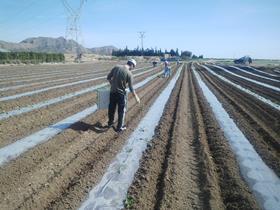
The fight to prevent Tomato Leaf Curl New Delhi Virus (ToLCNDV) from spreading through Spanish melon crops appears to be paying off. Andalusia’s Council of Agriculture, Fisheries and Rural Development said the virus, which caused widespread damage to courgette harvests across Almeria at the end of last year, has not affected the region’s melon production.
Tighter controls in greenhouses and plantations have been largely successful in keeping ToLCNDV at bay, with the virus being detected in just one of every 450 melon plants, the council said. In the plantations where the recommendations of the Plant Protection Services of the Government of Andalusia were not implemented, detection levels were higher.
Andalusia’s Plant Protection Services advise growers to employ a range of measures to control the virus. These include controlling the population of why fly, the vector that transmits the virus, through biological controls or chemical treatments; mass usage of traps to capture and monitor the whitefly and ensuring that healthy seeds which are free of the vector are planted.
It also recommends that greenhouses are hermetically sealed to prevent insects from entering them and that affected plants are uprooted immediately and properly disposed of.



